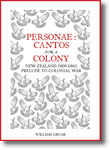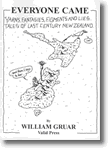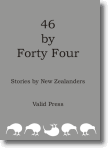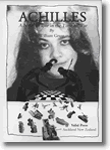Achilles
ACHILLES
A Novel of Love in the Time of War
By William Gruar
$25.00
ISBN 0-473-08877-0
300 pp Paper Back Perfect Bound Four Colour Cover
Postage inclusive within New Zealand.
Add $5 for overseas postage.
About
Achilles begins in the hearts of an idealistic young New Zealand couple who unwillingly become enmeshed in war. Set in New Zealand, Egypt, Greece and Crete in the early years of World War Two, Achilles provides documentation which shows clearly that New Zealand became involved in battles that it was not invited to, prepared for, or able to fight. Achilles has themes involving conscientious objection, politics in New Zealand, conscription, the effect of poorly followed through principles, and what happens when people in relationships fail to express themselves.
We learn of actual battles fought by New Zealanders through letters and documents. Meanwhile, back at home, the attentions of a handsome American provide more intrigue…
In the classic tradition of the eternal triangle/ménage `a trois, William Gruar has created a novel of love, humour and compassion.
Reviews
Book Review NZ Listener Dec 14 2002
- William Gruar, author of Achilles, has worked carefully and subtly to convey his timeless anti-war message. The book is set during World War II. Sam Gurden, an educated bulldozer operator, leaves New Zealand and his girlfriend Rhondda to fight in Egypt and Greece as part of the Engineers. Sam believes this will involve no actual combat, but rather the construction of strategic bridges, trenches and minefields. Rhondda is frustrated by his lack of conviction to their shared pacifist ideals, and eventually goes to bed with a charming American, Hank, working for the Caterpillar bulldozer company. The story follows Sam's adventures back home, their correspondence by mail and, finally, his unsettling return to New Zealand.
His obvious love of words and history made the portrayal of army life in the Mediterranean accessible and entertaining. Excerpts from the Department of Internal Affairs' official war documentation are interspersed to describe moments of critical action, which relieves the narrative of a lot of gore, but still reminds us of events.
Gruar's characters have all the three dimensionality of real people. Rhondda is a delicious creature who knows exactly where men want to put their willies; hence, she is endearingly assertive in her dealings with them. Although an advocate of (for the time) unconventional relationships, she is equally credible as a leader of the Christian Pacifist Society.
Then there is Sam, the pacifist-turned-soldier who, as the story transpires, devolves from a naïve and witty analyst of his situation to a hardened killer, immune to such details as the evacuation of his bowels and bladder when in shock. It is the strength of the characters that allows Gruar's olive-branch-waving to become apparent, but not irksomely transparent.
- Anna Chinn
From readers who remember World War Two:
- 'I served in the Middle East and in Italy … a good read - the story develops logically and convincingly and is throughout credible, both in settings and characters. Both New Zealand and overseas are clearly developed and carry an authentic atmosphere. Mr Gruar writes smoothly, handles dialogue exceptionally well and has no problem in conveying emotion or action. I warmly recommend the book.'
— Dr. S.G.Culliford, D.S.O., PhD. (English Lit.)
- 'I enjoy Mr Gruar's writing. In this fine work, as well as describing the horrors of war, he manages to capture the constant anxiety of a woman whose husband is in danger somewhere overseas … I well remember the day I received the cable telling me that Harold was injured at Cassino … Achilles brings it all back to me very clearly.'
— Hazel Norris, Christchurch.
- 'Achilles is well constructed and holds one's interest to the end - quite absorbing. Having fought in the campaigns described I found it authentic. His criticisms of the higher commands in the conduct of the campaigns and policy decisions by the politicians would be shared by most soldiers.'
— A.R. Guthrey, M.C., O.B.E.






